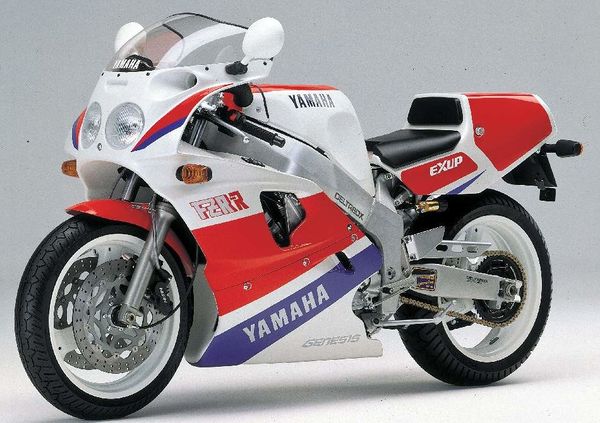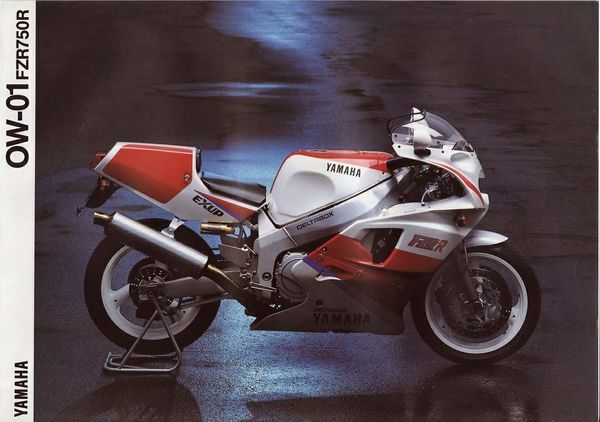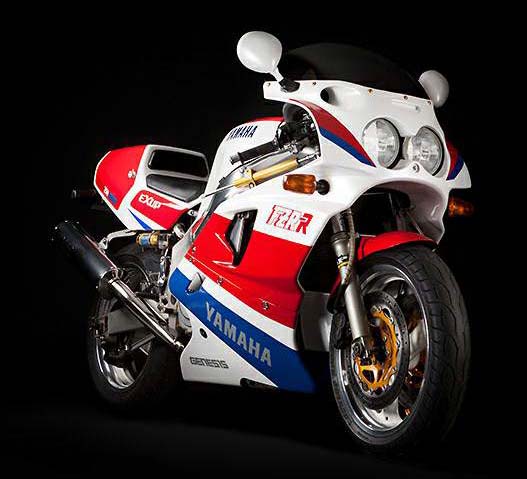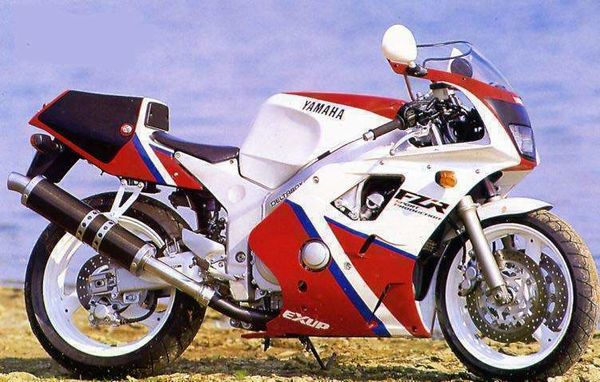Difference between revisions of "Yamaha FZR750RR OWO1"
(adding recommended_oil) |
(template fixes) |
||
| Line 1: | Line 1: | ||
{{Motorcycle | {{Motorcycle | ||
|name = | |name = Yamaha FZR750RR OWO1 | ||
|photo=Yamaha-FZR750R-OWO1-89--4.jpg | |photo=Yamaha-FZR750R-OWO1-89--4.jpg | ||
|aka = | |aka = | ||
| Line 9: | Line 9: | ||
|predecessor = | |predecessor = | ||
|successor = | |successor = | ||
|class = | |class =Sportbike | ||
|engine = Four stroke, transverse four cylinder, DOHC, 5 valves per cylinder. | |engine = Four stroke, transverse four cylinder, DOHC, 5 valves per cylinder. | ||
|bore_stroke = | |bore_stroke = | ||
Latest revision as of 22:37, 23 November 2019
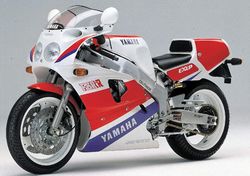 |
|
| Yamaha FZR750RR OWO1 | |
| Manufacturer | |
|---|---|
| Production | 1989 |
| Class | Sportbike |
| Engine | Four stroke, transverse four cylinder, DOHC, 5 valves per cylinder. |
| Compression ratio | 11.2:1 |
| Top Speed | 257.8 km/h / 160.1 mph |
| Ignition | Transistor controlled digital |
| Spark Plug | NGK, DR8ES-L |
| Transmission | 6 Speed |
| Frame | Aluminum, twin spar |
| Suspension | Front: 43mm Telescopic preload forks, compression and rebound damping adjustment, Rear: Öhlins Monocross preload compression and rebound damping adjustment, |
| Brakes | Front: 2x 280mm discs 4 piston calipers Rear: Single 177mm disc 2 piston caliper |
| Front Tire | 120/70-ZR17 |
| Rear Tire | 170/60-ZR17 |
| Weight | 187 kg / 412 lbs (dry), |
| Recommended Oil | Yamalube 10w-40 |
| Fuel Capacity | 23 Liters / 5.2 US gal |
| Manuals | Service Manual |
It could reach a top speed of 257.8 km/h / 160.1 mph.
Engine[edit | edit source]
The engine was a Liquid cooled, cooled Four stroke, transverse four cylinder, DOHC, 5 valves per cylinder.. The engine featured a 11.2:1 compression ratio.
Drive[edit | edit source]
Power was moderated via the Wet, multiple discs, cable operated.
Chassis[edit | edit source]
It came with a 120/70-ZR17 front tire and a 170/60-ZR17 rear tire. Stopping was achieved via 2x 280mm discs 4 piston calipers in the front and a Single 177mm disc 2 piston caliper in the rear. The front suspension was a 43mm Telescopic preload forks, compression and rebound damping adjustment, while the rear was equipped with a Öhlins Monocross preload compression and rebound damping adjustment,. The FZR750RR OWO1 was fitted with a 23 Liters / 5.2 US gal fuel tank. The bike weighed just 187 kg / 412 lbs.
Photos[edit | edit source]
Overview[edit | edit source]
Yamaha FZR 750RR OWO1
If this machine looks like a racer, it's because it is! Thinly
disguised to make it street legal, removal of the tax
disc, number plate, mirrors, indicators and side stand and
fitting some slicks prepares it for the racetrack. Why, then, is
it available to the road rider? The reason is relatively simple.
The OWOl was built to compete against Honda's RC30 and Bimota's
YB4 in World Super- bike racing. In order to campaign a machine
in this class certain homologation rules have to be met; these
depend on the annual output of motorcycles. If a manufacturer
produces more than 100,000 units a year, a minimum of 1,000 of
its Superbike contender must be built.
Between 50,000 and 100,000, 500 Superbikes are necessary. Small scale manufacturers (like Bimota) only have to build 200 Super-bikes to be eligible. In Yamaha's case they have to build 1,000, which means that some go on sale, albeit at huge expense, for road use. They come sparsely equipped for the task. The OWOl isn't a road bike, it's a sports-stiff, high-revving, factory racer. As standard, it comes pretty competitively set up for the track. An expensive racekit is available to further hone its fiery performance and turn what's already a lean and purpose-built beast into a real short-fuse, speedball racetrack weapon. Apart from the wonders of five-valve technology and inclined cylinders, the OWOl has little in common with the popular FZ750 roadster. Instead it's cobbled together using lessons learnt from the rare and precious YZF750 Genesis, the factory endurance racer, with lots of FZR1000 bits and knowhow thrown in for good and plentiful measure.
The engine is incredibly oversquare and short-stroked. Every part of its assembly is dedicated to getting the biggest and most efficient bangs for your money. It sucks through forward-facing fresh air ducts in the fairing, mixing and feeding the gas through large flat-slide 38mm Mikunis. It has big' valves and big, hand-finished ports. Lightweight, short-skirt, stepped-top pistons with large valve cutaways ride on titanium con rods and compress the gas to 11.2:1 (with the racekit this is upped to 13.5 or more). At the same time as it controls ignition timing. Providing a fat spark, an eight-bit microprocessor decides when to activate a servo motor operating a butterfly valve in the collector of the stainless steel four-into-one exhaust system. As on the FZR1000, this exhaust valve (EXUP) compensates for losses in the mid-range that are inevitable in any engine developed for maximum power and torque. The EXUP rotary valve has to close off up to 70 per cent of the exhaust and operate in temperatures of up to 700-degrees C. but it certainly works.
What should be an essentially
peaky, sky-high, rev-happy motor is actually endowed with a useful, long
flat spread of torque. It can be ridden from 0-5000rpm with fast response
and the delivery is crisp, flexible and smooth. It reserves its best power
for between 8000 and 13,500rpm, quite a wide range of meaty acceleration. In
its stride, it peaks at about 12,000rpm. Translate that through six
close-ratio gears into road speed and in top the bike clocks 162mph. A
race-kitted version, lighter and more powerful will be tall-geared for over
170mph.
With the cylinders angled forward
at40-degrees (instead of the 45-degrees of the FZ750 road bike), Yamaha's
chassis designers took full advantage of the layout and assembled a short,
stiff frame, a short wheelbase, fast steering geometry and lots of Ground Clearance. The deep section aluminum Deltabox frame is obviously rigid and
the swing-arm is beautifully crafted. Suspension front and back is by top
notch Öhlins units which are multi-adjustable for individual ride
preferences.
The huge brakes sport Nissan
four-piston racing calipers and 320mm discs.
Generally, the bike is very stable on the power, though the steering isn't as quick and nervy as racers typically like. Although the bike is clearly competitive weight-wise, in standard trim it has to be wrestled with, needing a firm grip and a lot of rider input. Naturally, it wouldn't be a racer unless just about every part of its handling performance could be changed to suit the rider. The OWOl has more power, performance and commitment than the road rider could ever need.
| Make Model | Yamaha FZR 750RR OWO1 |
|---|---|
| Year | 1989 |
| Engine Type | Four stroke, transverse four cylinder, DOHC, 5 valves per cylinder. |
| Displacement | 749 cc / 45.7 cu-in |
| Bore X Stroke | 72 x 46 mm |
| Cooling System | Liquid cooled, |
| Compression | 11.2:1 |
| Lubrication | Wet sump |
| Engine Oil | 10W/40 |
| Exhaust | Alloy muffler |
| Induction | 4X 38mm Mikuni carbs |
| Ignition | Transistor controlled digital |
| Spark Plug | NGK, DR8ES-L |
| Starting | Electric |
| Max Power | 121 hp / 88.3 kW @ 12000 rpm |
| Max Power Rear Tire | 108.8 hp @ 12500 rpm |
| Max Torque | 7.2 kgf-m / 69,6 Nm @ 9000 rpm |
| Clutch | Wet, multiple discs, cable operated |
| Transmission | 6 Speed |
| Final Drive | Chain |
| Frame | Aluminum, twin spar |
| Front Suspension | 43mm Telescopic preload forks, compression and rebound damping adjustment, |
| Rear Suspension | Öhlins Monocross preload compression and rebound damping adjustment, |
| Front Brakes | 2x 280mm discs 4 piston calipers |
| Rear Brakes | Single 177mm disc 2 piston caliper |
| Front Tire | 120/70-ZR17 |
| Rear Tire | 170/60-ZR17 |
| Dry Weight | 187 kg / 412 lbs |
| Wet+ Weight | 215 kg / 474 lbs |
| Fuel Capacity | 23 Liters / 5.2 US gal |
| Consumption Average | 16.2 km/lit |
| Braking 60 - 0 / 100 - 0 | 12.7 m / 35.3 m |
| Standing ¼ Mile | 10.7 sec / 205.8 km/h |
| Top Speed | 257.8 km/h / 160.1 mph |
| Road Test | Bike Magazine Moto.Revue 1989 Motorrad YB4 vs FZR750R Motosprint Group Test 1990 Performance Bike Yamaha OWO1 vs Honda RC30 |
